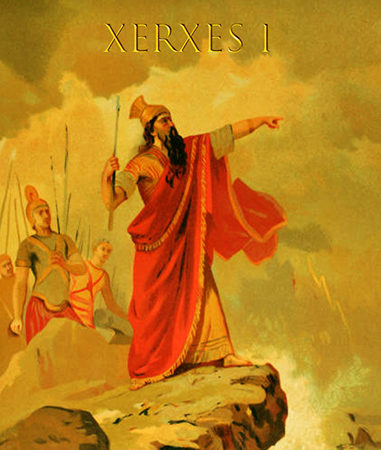
Xerxes' kingly presence in the invasion of Greece is a marked change from his father, Darius I, who twice delegated command of a task force against Greece: first to Mardonius (492 BC) to whom he was uncle, father-in-law, and half-brother-in-law; and secondly to his nephew Artaphernes, and Datis (490 BC), a Median noble and admiral. Mardonius had some successes but a storm off the coast near Mount Athos destroyed his fleet lost 300 ships and had to end his campaign. Artaphernes and Datis after initial successes were intent on establishing a bridghead in the eastern shores of Greece, but ended instead in embarrasing defeat at Marathon.
No more inadequate numbers with the King's son, the new king. Xerxes I. Now the Great King commands the expedition himself, in person, and brings everybody. The Royal Presence in itself implies much. The stage is set from the beginning for a truly great event, and perhaps even the Great Event Young speaks of, as a construct in Herodotus' mind, into which we all have bought. Successful conscriptions for Xerxes' army ends with a contest among the satrapies, for the best military contingent exhibiting the desire qualites in the levies about to join the army led by the king himself in magnificent parade.
Former rebel satrapies and newly acquired ones ought to be awed by the spectacle going through their soil: the millions of Asia behind their King; they are to leave no doubt the the royal house is ultimately irresistible and its futile to deny its wishes. Herodotus says later that he never got to find out how the contest ended. His alleged desire to invent must have taken leave that day, perhaps.
The fact that Herodotus is our sole source for most of these events, is an obvious disadvantage when wishing to feel confident, but I dare say that second best to having multiple, independent sources, is consistency within a sole source. And on that score Herodotus excels, he consistently communicates the notion of big and unprecedented when describing the march, the bridges, the camps, the scale of some events, and it must add to something unless ones believes that Herodotus was out to con everyone.
